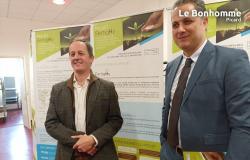Le Devoir today publishes the extract from a book to be published in spring 2025 by Somme tout/Le Devoir. The work, signed by Pascal Mailhot and Marie-Michèle Sioui, traces the history of the health network, from the birth of health insurance to that of the Santé Québec agency. The former political advisor and the journalist interviewed nearly thirty personalities from all political horizons. Through reforms and crises, they take a look at significant periods in the history of health in Quebec, notably that of the COVID-19 pandemic, which they experienced on both sides of the wall. of politics. In this third part: Christian Dubé reveals the new mission of the Ministry of Health.
On October 17, the members of the cabinet sit around the large table of the sugar shack of the Minister of Health, Christian Dubé. The minister organized a meeting with his entire team at his home in Sutton. Soon, he will publicly announce the new mission of the Ministry of Health focused on prevention.
Political advisor Florence Bélanger emphasizes that the network still relies too much on a curative approach. The minister’s chief of staff, Julie Lussier, emphasizes that prevention has until now been relegated “to the number of fruits and vegetables we eat and tobacco.”
In the form of a game, the fifteen members of the cabinet write down their proposals on small pieces of paper. Perhaps the minister will have to give up his little caramels? Mr. Dubé regularly refers to these treats, which he says he eats to calm his mood. But candy may no longer send the right image. “To be maintained in moderation”, decides the director of planning, Mylène Dalaire.
Mr. Dubé’s bike rides, on the other hand, fit well with the new image that the ministry wants to give itself. In a world of communications and perceptions, cabinet members see opportunity. One of them suggests that the minister arrive by bicycle at the National Assembly. A sign of the times – or of a certain automotive culture – everyone bursts out laughing. The minister sees no objection. Or finally, he sees just one. “Where do I shower?” he asks. If you sort this out for me, I can do it. » Mr. Dubé seems excited by this new sportsman image. He wants to publicize his morning jog on the Plains of Abraham and organize a bike race in his constituency.
An accountant’s reflex, however, it brings the debate back to the figures. “We need to know how much we put into prevention. If we want to be serious, we will have to prove it with figures,” he says. The prevention budget barely reaches half a percentage point at the Ministry of Health. Perhaps this proportion should be increased to 1 or 2%? The minister is annoyed not to know the exact number. “Is anyone going to take that hat?” » he asks. “I’ll take care of it,” replies Florence Bélanger.
Getting out the big messages
Two weeks later, on November 1, the advisor found the minister in a room in the amphitheater of the Coeur des sciences at UQAM. In twenty minutes, Christian Dubé must give what he hopes will be a meaningful speech. Because finally, he hopes, health prevention will become a real priority in Quebec, after decades of empty promises.
He participates in the event “A new vision of health”. The entire Quebec health prevention ecosystem is here: researchers, doctors, managers, civil society actors. An informed audience, who only wants to hear one thing: the announcement of a real shift towards prevention and better lifestyle habits.
A few minutes before the minister’s speech, his team is finalizing the final details. Press officer Audrey Noiseux knows that her boss will ask her what her three key messages are, no more. Florence Bélanger, who is in charge of the event, tenses up slightly. Cerebral and methodical, she spent weeks preparing for this public outing. “I hope the big messages come out…” she whispers, nervously fiddling with her phone.
The minister enters, his features slightly drawn, but his eyes sparkling.
— There was a lot of singing yesterday?, asks his advisor Francis Boucher.
— Quite a spectacle! exclaims Dubé. This man, at 75 years old, was on stage for three hours with a band… Extraordinary ! One of the best shows I’ve seen.
The day before, he was one of the 20,000 people packed into the Bell Center in Montreal to see Bruce Springsteen and his E Street Band. The minister had difficulty falling asleep: the songs were running through his head and the adrenaline kept him awake. His advisors exchange amused glances. Christian Dubé cultivates an almost family bond with his team, far from the protocol distance kept with civil servants.
— Jonathan Trudeau spoke about the announcement this morning on the radio, M informsme Noiseux, speaking of the political columnist of 98.5. He says that prevention is all well and good, but above all the world wants to have a family doctor.
— Access remains the basis, agrees the minister, becoming serious again. He’s right.
“The urgent and the important”
Dubé did not arrive at the event by bike. But he put on his Roses t-shirt, the Montreal team in the new professional women’s soccer league. “If you are kind, I brought a few,” he says to those around him.
The atmosphere is very different from that which reigned during the unveiling of the Health Plan, this roadmap for the network unveiled in March 2022. At the time, Dubé had adopted an almost monastic approach. With Mylène Dalaire, he dissected his speech sentence by sentence. The moment was solemn for him: the starting point of what he sees as the most important organizational transformation in the history of Quebec, with the creation of Santé Québec.
In the meantime, there was the adoption of Bill 15, negotiations with the unions, the ban on the use of private agencies for healthcare personnel. Today, in the reflections of Dubé and his team, a vision is emerging: the prevention and reduction of disease are called to be at the heart of the new mission of a Ministry of Health and Social Services 2.0. While Santé Québec will take care of managing the network and treating the sick, the MSSS will be able to concentrate on its fundamental mission: keeping the population healthy. The tandem seems perfect to them. On one side, an agency that coordinates care. On the other, a ministry focused on the future, which focuses on prevention to reduce pressure on the system.
Florence Bélanger intervenes, keen to bring the conversation to the core issues.
— Messages must be clear. Santé Québec gives us the opportunity to review the vocation of the ministry.
— Prevention doesn’t pay off politically, admits Dubé. But you know my approach: there is the urgent, and there is the important.
Around the table, the members of his team nod their heads in silence. This phrase is one of the minister’s favorite mantras.
The arrival of the Minister responsible for Seniors, Sonia Bélanger, interrupts their discussion. She will also speak to the audience.
“It’s a great event,” she says. It’s positive!
“It proves that we are beginning to enter the future,” replies Dubé, heading towards the amphitheater.
Will this time be the right one?
The room is full. In second row, the Dr Horacio Arruda settles in discreetly. The former national director of public health did not want to miss this moment. He who weathered the COVID-19 storm knows better than anyone the importance of prevention.
At 9 a.m. sharp, Christian Dubé takes the stage with his iPad, which follows him everywhere. He has a lot of data in his head. The minister is a “numbers freak”, as those close to him know well. His mental universe is essentially made up of performance indicators – a bit like the green code that parades in the cult film At the matrix.
— In 2004, the health budget was 20 billion. In 2018, 40 billion, he begins. And today it is 60 billion. In six years, that’s an increase of 50%. This is untenable.
The Quebec government may feed the beast, but the demand for health services continues to grow. Minister Bélanger underlines on the microphone that in 2031, 24% of the Quebec population will be 65 years old and over. “We are arriving at a major demographic change,” she says.
Smoking costs $4 billion per year, Minister Dubé has just recalled. “Obesity,” he adds, saying he fastens his jacket to hide his belly, “is nearly 3 billion. Alcohol? Three billion. The impact of these less healthy lifestyle habits is major. »
In a month to the day, he recalls, Santé Québec will take off. A unique opportunity to rethink the mission of the ministry. Dubé announces his intention to present a national prevention policy in spring 2025.
At the front of the room, the Dr Arruda nods. “It’s a good commitmenthe confides. We want to go further. Mobilize the actors, give energy. Ultimately, we also hope that there will be more money. »
But a question is circulating among the audience: will this time be the right one? Because for twenty years, prevention has often been the subject of fine words, never followed by concrete actions. And even less hard cash. The minister knows it. In a short discussion with his team after his speech, he returned to the proportion of public funds allocated to prevention.
— You have large health organizations in the Scandinavian countries which spend 3, 4, 5% of their budgets on prevention. If you had that here in Quebec, out of 60 billion, you would be talking about 2 billion, 2 and a half billion, excluding public health, he insists. Is vaccination prevention, Sonia?
— Yes, replies his colleague.
An advisor brings granola bars and coffee, to the obvious satisfaction of the ministers. Christian Dubé grabs a drink, then stops.
— Is that healthy for you? he asks.






